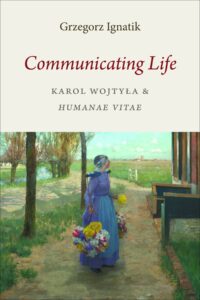The John Paul II Institute’s Humanum Academic Press is pleased to announce two recent publications:
Communicating Life: Karol Wojtyla and Humanae Vitae
by Grzegorz Ignatik
This book presents Karol Wojtyła’s contribution and interpretation of Paul VI’s encyclical on the transmission of human life from historical, ethical, and sacramental perspectives. The central theme of Communicating Life concerns the value of the human person in the mystery of life and its “tradition” in the dimension of temporariness. The book examines Wojtyła’s original texts, consults the most recent scholarship in the field, and includes the English translations of the Wojtylian contributions to Humanae vitae, including his 1966, 1968, and 1971 memoranda sent directly to Pope Paul VI.
Three Short Works by Ferdinand Ulrich
Ferdinand Ulrich has been hailed by some as one of the greatest Catholic philosophers of the Twentieth Century. Though he ceased writing in the 1980s, his works are only now being translated into English. The three works collected in this volume present dimensions of Ulrich’s unique philosophical anthropology, which he developed in the light of the metaphysics laid out in Homo Abyssus. The first work, Atheism and Incarnation, reflects on man’s personal and cultural attempt to be fully human in the context of contemporary culture, showing how the question of God emerges right at the heart of this effort. The second work, Man in the Beginning: Towards a Philosophical Anthropology of Childhood, offers a remarkable metaphysical exploration of the child’s development of personality in relation to his mother and father, in critical dialogue with several “prophets” of modern thought: Hegel, Marx, Nietzsche, and Freud. He shows that, far from presenting a problem that needs to be resolved or overcome, the child reveals a fundamental truth about human existence: namely, that we become ourselves in receiving ourselves from others. The third work, Prayer as the Fundamental Act of the Creature, presents what Hans Urs von Balthasar called a “summa” on prayer, which contains everything essential. One of the things that makes Ulrich’s essay unique is his rooting of prayer, and so the encounter with God, in the person’s very act of existence. This approach brings to light depths of the spiritual life that have rarely been explored before. Altogether, the three works offer a pathway into Ulrich’s philosophy that is more accessible than that given in Homo Abyssus, and show some of the concrete implications of that earlier, groundbreaking work.
Both books are distributed by The Catholic University of America Press and can be purchase from the CUA Press site.

